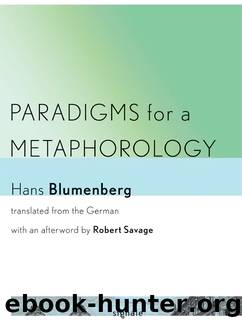Paradigms for a Metaphorology by Blumenberg Hans Savage Robert

Author:Blumenberg, Hans,Savage, Robert
Language: eng
Format: epub
ISBN: 978-0-8014-7695-2
Publisher: Cornell University Press
VII
Myth and Metaphorics
If we attempt now to elaborate and set out a typology of metaphor histories with the help of paradigms, this does not imply that the thematic goal and ideal of the metaphorology we have in mind would consist in such a typology. In carrying out this task, we should recall that metaphorology—as a subbranch of conceptual history, and like the latter itself considered as a whole—must always be an auxiliary discipline to philosophy as it seeks to understand itself from its history and to bring that history to living presence. Our typology of metaphor histories must accordingly endeavor to distinguish and work through particular aspects—new aspects, perhaps—of philosophy’s historical self-understanding. In the process, it is above all the transitions that will allow the specificity of each metaphor and its expressive forms to appear in sharper focus.
One such phenomenon of ‘transition’ arises from the relationship between myth and metaphorics. From this perspective, the ‘myths’ of Plato by no means prove to be homogeneous means of expression; we can see also that the schema that posits a dualism of mythos and logos, or a transition from one to the other, fails to grasp their functional differences in an adequate fashion.1 The allegorical exegesis of myth, as practiced first by the Sophists and then, above all, by the Stoics, took mythos to be a ‘preliminary form’ of logos, grasping it as an essentially convertible utterance. This schema has its correlate in an interpretation of myth that still holds sway today. Myth is regarded as a ‘prelogical’ phenomenon and assigned to a primitive form of mental ‘development’ that has been superseded and supplanted by more exact forms of understanding. But what has emerged from our reflections under the heading of ‘absolute metaphor’ has, in its indissoluble alogicality, given us reason to believe that such Cartesianism avant la lettre brings an inappropriate norm to the historical findings. In myth, too, questions are kept alive that refuse to yield to theoretical answers without thereby becoming obsolete. The difference between myth and ‘absolute metaphor’ would here be a purely genetic one: myth bears the sanction of its primordial, unfathomable origin, its divine or inspirative ordination, whereas metaphor can present itself as a figment of the imagination, needing only to disclose a possibility of understanding in order for it to establish its credentials. The Platonic Socrates qualifies the myth of the judgment of the dead in the “Gorgias” by asserting that what Callicles will regard as a “fable” (muthos), he himself holds to be an “actual account” (logos).2 This myth arises in the dialogue from a deep sense of discomfort concerning the need to find an answer to the question of final justice. Socrates has tried, using all the argumentative means at his disposal, to cling to the idea of a justice immanent to history. All too often, the Athenian polis has condemned its finest men and so committed what appears to be a gross injustice; but Socrates dares to claim that here a crucial dereliction
Download
This site does not store any files on its server. We only index and link to content provided by other sites. Please contact the content providers to delete copyright contents if any and email us, we'll remove relevant links or contents immediately.
| Books & Reading | Comparative Literature |
| Criticism & Theory | Genres & Styles |
| Movements & Periods | Reference |
| Regional & Cultural | Women Authors |
4 3 2 1: A Novel by Paul Auster(12363)
The handmaid's tale by Margaret Atwood(7750)
Giovanni's Room by James Baldwin(7316)
Asking the Right Questions: A Guide to Critical Thinking by M. Neil Browne & Stuart M. Keeley(5751)
Big Magic: Creative Living Beyond Fear by Elizabeth Gilbert(5749)
Ego Is the Enemy by Ryan Holiday(5412)
The Body: A Guide for Occupants by Bill Bryson(5075)
On Writing A Memoir of the Craft by Stephen King(4925)
Ken Follett - World without end by Ken Follett(4719)
Adulting by Kelly Williams Brown(4564)
Bluets by Maggie Nelson(4542)
Eat That Frog! by Brian Tracy(4518)
Guilty Pleasures by Laurell K Hamilton(4437)
The Poetry of Pablo Neruda by Pablo Neruda(4090)
Alive: The Story of the Andes Survivors by Piers Paul Read(4017)
White Noise - A Novel by Don DeLillo(3999)
Fingerprints of the Gods by Graham Hancock(3985)
The Book of Joy by Dalai Lama(3968)
The Bookshop by Penelope Fitzgerald(3843)
